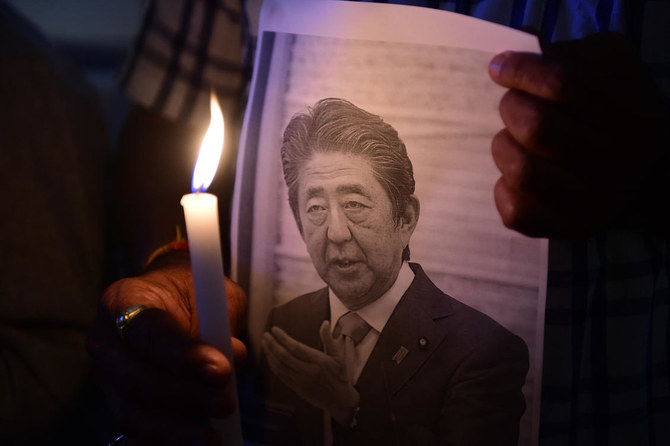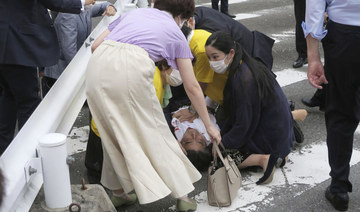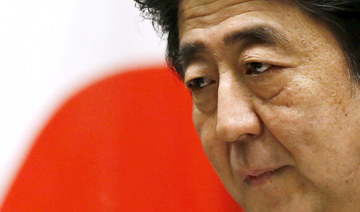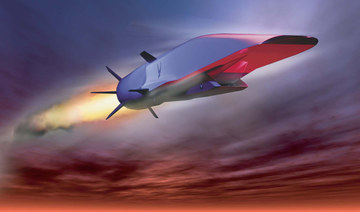TOKYO: Japanese went to the polls Sunday in the shadow of the assassination of former Prime Minister Shinzo Abe, gunned down while making a campaign speech for the governing party that cruises to a likely major victory.
Amid voting Sunday, police in western Japan sent the alleged assassin to a local prosecutors’ office for further investigation toward pressing murder charges, the day after a top regional police official acknowledged possible security lapses that allowed the attacker to get so close and fire a bullet into the still-influential former Japanese leader.
In a country still recovering from the shock, sadness and fear of Abe’s shooting — the first of a former or serving leader to be assassinated in postwar Japan — polling started for half of the upper house, the less powerful of Japan’s two-chamber parliament.
Abe was shot in Nara on Friday and airlifted to a hospital but died of blood loss. Police arrested a former member of Japan’s navy at the scene. Police confiscated his homemade gun and several others were later found at his apartment.
The alleged attacker, Tetsuya Yamagami, told investigators he acted because of Abe’s rumored connection to an organization that he resented, police said, but had no problem with the former leader’s political view. The man had developed hatred toward a religious group that his mother was obsessed about and that bankrupted a family business, according to media reports, including some that identified the group as the Unification Church.
Abe’s body, in a black hearse accompanied by his wife, Akie, returned to his home in Tokyo’s upscale residential area of Shibuya, where many mourners, including Prime Minister Fumio Kishida, their predecessors and top party officials, paid tribute. His wake and funeral are expected in coming days.
Nara prefectural police chief Tomoaki Onizuka on Saturday said that Abe’s assassination was his “greatest regret” in his 27-year career. He said problems with security were undeniable, that he took the shooting seriously and will review the guarding procedures.
Abe’s assassination ahead of Sunday’s parliamentary election shocked the nation and raised questions over whether adequate security was provided for the former prime minister.
Some observers who watched videos of the attack noted a lack of attention in the open space behind Abe as he spoke.
Experts also said Abe was more vulnerable standing on the ground level instead of atop a campaign vehicle, a standard for premier-class politicians, but that option was reportedly unavailable due to his hastily arranged visit to Nara.
Mitsuru Fukuda, a crisis management professor at Nihon University, said police were seen focusing frontward and paying little attention to what was behind Abe, noting that the suspect was approaching the former leader unnoticed until he fired the first shot.
“Clearly there were problems,” Fukuda said.
The first shot narrowly missed Abe and hit an election vehicle. The second entered from his upper left arm damaged his neck artery, causing massive bleeding and death.
Fukuda said that election campaigns provide a chance for voters and politicians to interact because “political terrorism” was extremely rare in postwar Japan. It’s a key democratic process, but Abe’s assassination could prompt stricter security at crowded events like campaigns, sports games and others.
On Saturday, when party leaders went out for their final appeals under heightened security, there were no more fist-touches — a COVID-19 era alternative to handshakes — or other close-proximity friendly gestures they used to enjoy.
After Abe’s assassination, Sunday’s election had a new meaning, with all political leaders emphasizing the importance of free speech and their pledge not to back down to violence against democracy.
“We absolutely refuse to let violence shut out free speech,” Kishida said in his final rally in northern city of Niigata on Saturday amid tightened security. “We must demonstrate that our democracy and election will not back down to violence.”
According to the Asahi newspaper, Yamagami was a contract worker at a warehouse in Kyoto, operating a forklift. He was described as a quiet person in the beginning but started ignoring rules that led to quarrels with his colleagues, then he started missing work and quit in April citing health problems. A next-door neighbor at his apartment told Asahi he never met Yamagami, though he recalled hearing noises like a saw being used several times late at night over the past month.
Japan is known for its strict gun laws. With a population of 125 million, it had only 21 gun-related criminal cases in 2020, 12 of them gang-related, according to the latest government crime paper. Experts say, however, some recent attacks involved use of consumer items such as gasoline, suggesting increased risks for ordinary people to be embroiled in mass attacks.
While media surveys have predicted a major victory for the governing Liberal Democratic Party amid fractured and weak opposition, a wave of sympathy votes from Abe’s assassination could bring a bigger victory than Kishida’s modest goal of winning the house majority.
Even after stepping down as prime minister in 2020, Abe was highly influential in the LDP and headed its largest faction. His absence could change power balance in the governing party that almost uninterruptedly ruled postwar Japan since its 1955 foundation, experts say.
“This could be a turning point” for the LDP over its divisive policies on gender equality, same-sex marriages and other issues that Abe-backed ultra-conservatives with paternalistic family values had resisted, said Fukuda.
Japan’s current diplomatic and security stance is unlikely to change because fundamental changes had been already been made by Abe. His ultra-nationalist views and realistic policy measures made him a divisive figure to many, including in the Koreas and China.
Abe stepped down two years ago blaming a recurrence of the ulcerative colitis he’d had since he was a teenager. He said he regretted leave many of his goals unfinished, including the issue of Japanese abducted years ago by North Korea, a territorial dispute with Russia, and a revision to Japan’s war-renouncing constitution that many conservatives consider a humiliation because of poor public support.
Abe was groomed to follow in the footsteps of his grandfather, former Prime Minister Nobusuke Kishi. His political rhetoric often focused on making Japan a “normal” and “beautiful” nation with a stronger military through security alliance with the United States and bigger role in international affairs.
He became Japan’s youngest prime minister in 2006, at age 52. But his overly nationalistic first stint abruptly ended a year later, also because of his health, prompting six years of annual leadership change.
He returned to office in 2012, vowing to revitalize the nation and get its economy out of its deflationary doldrums with his “Abenomics” formula, which combines fiscal stimulus, monetary easing and structural reforms. He won six national elections and built a rock-solid grip on power.
Japan votes for key election in shadow of Abe assassination
https://arab.news/2dbwd
Japan votes for key election in shadow of Abe assassination

- Police arrested a former member of Japan’s navy at the scene
- Abe’s assassination ahead of Sunday’s parliamentary election shocked the nation and raised questions over whether adequate security was provided for the former prime minister.
Japan, US move ahead in co-developing hypersonic weapons interceptor as regional threats grow

TOKYO: Japan and the United States on Wednesday signed an arrangement to jointly develop a new type of missile defense system as the allies seek to defend against the growing threat of hypersonic weapons, which are possessed by China and Russia and being tested by North Korea.
The project was initially agreed between Japan’s Prime Minister Fumio Kishida and US President Joe Biden at their summit last August and reaffirmed between the leaders during Kishida’s April visit to Washington. The Glide Phase Interceptor is planned for deployment by the mid-2030s.
Wednesday’s agreement determines the allocation of responsibility and decision-making process, a first major step in the project, Japanese defense ministry officials said. They hope to decide on Japanese contractors and start the development process by March 2025.
Hypersonic weapons are designed to exceed Mach 5, or five times the speed of sound, posing a threat to regional missile-defense systems with their speed and maneuverability. Developing interceptors of them is a challenge.

Japan’s defense ministry called it a “pressing issue” and noted that hypersonic weapons in the region have dramatically improved in recent years.
Under the arrangement, Japan is responsible for developing a part at the interceptor’s tip that separates in space to destroy the incoming warhead, as well as its rocket motors, officials said.
Japan has earmarked 75.7 billion yen ($490 million) for initial development and testing of the interceptor, according to the defense ministry.
The cost includes making components for the two companies, Raytheon Technologies and Northrop Grumman, that are developing the weapon in a competition led by the US Missile Defense Agency. One will be chosen for the project.
The MDA has estimated the cost to develop the hypersonic missile interceptor will exceed $3 billion, including Japan’s share of $1 billion.
The interceptors will be deployed on Aegis-class destroyers, like the ship-to-air Standard Missile-3 that Japan previously co-developed with the United States.
Japan has been accelerating its miliary buildup as it stresses the need to fortify its deterrence against growing threats. Japan has also significantly eased its weapons export policy to allow co-developed lethal weapons to third countries.
___
This story has been corrected to say GPI stands for Glide Phase Interceptor, not Glide Sphere Interceptor.
___
Follow AP’s Asia-Pacific news at https://apnews.com/hub/asia-pacific
Using frozen Russian assets for Ukraine must align with law, Japan says

TOKYO: Japanese Finance Minister Shunichi Suzuki said on Friday it is important that discussions will be aligned with international law when asked about a US proposal for using the interest derived from frozen Russian assets to aid Ukraine.
“Japan plans to join the discussions at the upcoming Group of Seven meeting from this basic standpoint,” Suzuki said.
Senegalese prime minister criticizes French military bases on territory

- “I reiterate here the desire of Senegal to have its own control, which is incompatible with the lasting presence of foreign military bases in Senegal," PM Sonko said
- Neighbours Mali, Burkina Faso and Niger have pushed out French troops and turned to Russia for help fighting jihadist insurgencies on their territory
DAKAR: Senegal’s prime minister Ousmane Sonko raised the possibility of closing French military bases in the West African country on Thursday in a wide-ranging speech that also touched on the euro-backed CFA franc currency, oil and gas deals and LGBTQ rights.
Sonko, a firebrand politician who gained power when his hand-picked presidential candidate Bassirou Diomaye Faye won a decisive victory in March, is known for criticizing perceived overreach by France in its former colony.
France has about 350 troops in Senegal.
“More than 60 years after our independence ... we must question the reasons why the French army for example still benefits from several military bases in our country and the impact of this presence on our national sovereignty and our strategic autonomy,” Sonko said at a joint conference with the French left-wing politician Jean-Luc Melenchon in the capital Dakar.
“I reiterate here the desire of Senegal to have its own control, which is incompatible with the lasting presence of foreign military bases in Senegal ... Many countries have promised defense agreements, but this does not justify the fact that a third of the Dakar region is now occupied by foreign garrisons.”
Neighbours Mali, Burkina Faso and Niger have pushed out French troops and turned to Russia for help fighting jihadist insurgencies on their territory.
They have also turned away from West African bloc ECOWAS — which condemned their coups — and formed their own alliance of Sahel states.
But Sonko had friendly words for them on Thursday.
“We will not let go of our brothers in the Sahel and we will do everything necessary to strengthen the ties,” he said.
He also said Senegal, which shares the euro-pegged CFA franc currency with seven countries, would like a flexible currency pegged to at least two currencies to help absorb shocks and support export competitiveness.
During the election campaign, Faye had initially pledged to abandon the CFA franc but later backed off his promise.
Sonko reiterated promises to renegotiate oil and gas contracts in Senegal, where production is due to begin this year.
He also called on Western countries to show “restraint, respect, reciprocity and tolerance” on social matters including LGBTQ rights and gender equality.
He said homosexuality had always existed in Senegal, but the country had “managed” it and would continue to do so according to its socio-cultural realities.
“Senegal and many other African countries cannot accept any truth in legalizing this phenomenon.”
China and Russia reaffirm their close ties as Moscow presses its offensive in Ukraine

- Putin and Xi said they were seeking an end to the war in Ukraine, but they offered no new proposals in their public remarks
- China claims to take a neutral position in the conflict, but continues to supply key components needed by Moscow for weapons production
BEIJING: Russian President Vladimir Putin and Chinese leader Xi Jinping on Thursday reaffirmed their “no-limits” partnership that has deepened as both countries face rising tensions with the West, and they criticized US military alliances in Asia and the Pacific region.
At their summit in Beijing, Putin thanked Xi for China’s proposals for ending the war in Ukraine, which have been rejected by Ukraine and its Western supporters as largely following the Kremlin’s line.
Putin’s two-day state visit to one of his strongest allies and trading partners comes as Russian forces are pressing an offensive in northeastern Ukraine’s Kharkiv region in the most significant border incursion since the full-scale invasion began on Feb. 24, 2022.
China claims to take a neutral position in the conflict, but it has backed the Kremlin’s contentions that Russia was provoked into attacking Ukraine by the West, and it continues to supply key components needed by Moscow for weapons production.
China, which hasn’t criticized the invasion, proposed a broadly worded peace plan in 2023, calling for a ceasefire and for direct talks between Moscow and Kyiv. The plan was rejected by both Ukraine and the West for failing to call for Russia to leave occupied parts of Ukraine.
China also gave a rhetorical nod to Russia’s narrative about Nazism in Ukraine, with a joint statement Thursday that said Moscow and Beijing should defend the post-World War II order and “severely condemn the glorification of or even attempts to revive Nazism and militarism.”
Putin has cited the “denazification” of Ukraine as a main goal of the military action, falsely describing the government of Ukrainian President Volodymyr Zelensky, who is Jewish and lost relatives in the Holocaust, as neo-Nazis.
The largely symbolic and ceremonial visit stressed partnership between two countries who both face challenges in their relationship with the US and Europe.
“Both sides want to show that despite what is happening globally, despite the pressure that both sides are facing from the US, both sides are not about to turn their backs on each other anytime soon,” said Hoo Tiang Boon, who researches Chinese foreign policy at Singapore’s Nanyang Technological University.
While Putin and Xi said they were seeking an end to the war, they offered no new proposals in their public remarks.
“China hopes for the early return of Europe to peace and stability and will continue to play a constructive role toward this,” Xi said in prepared remarks to media in Beijing’s Great Hall of the People. His words echoed what China said when it offered a broad plan for peace.
Earlier, Putin was welcomed in Tiananmen Square with military pomp. After a day in Beijing, the Russian leader arrived in Harbin, where he was expected to attend a number of events on Friday.
On the eve of his visit, Putin said China’s proposal could “lay the groundwork for a political and diplomatic process that would take into account Russia’s security concerns and contribute to achieving a long-term and sustainable peace.”
Zelensky has said any negotiations must include a restoration of Ukraine’s territorial integrity, the withdrawal of Russian troops, the release of all prisoners, a tribunal for those responsible for the aggression and security guarantees for Ukraine.
After Russia’s latest offensive in Ukraine last week, the war is in a critical stage as Ukraine’s depleted military waits for new supplies of anti-aircraft missiles and artillery shells from the United States after months of delay.
The joint statement from China and Russia also criticized US foreign policy at length, hitting out at US-formed alliances, which the statement called having a “Cold War mentality.”
China and Russia also accused the US of deploying land-based intermediate range missile systems in the Asia-Pacific under the pretext of joint exercises with allies. They said that the US actions in Asia were “changing the balance of power” and “endangering the security of all countries in the region.”
The joint statement demonstrated China’s support to Russia.
China is “falling over themselves to give Russia face and respect without saying anything specific, and without committing themselves to anything,” said Susan Thornton, a former diplomat and a senior fellow at the Paul Tsai China Center at Yale Law School.
The meeting was yet another affirmation of the friendly “no-limits” relationship China and Russia signed in 2022, just before Moscow invaded Ukraine.
Since then, Russia has become increasingly dependent economically on China as Western sanctions cut its access to much of the international trading system. China’s increased trade with Russia, totaling $240 billion last year, has helped the country mitigate some of the worst blowback from sanctions.
Moscow has diverted the bulk of its energy exports to China and relied on Chinese companies for importing high-tech components for Russian military industries to circumvent Western sanctions.
“I and President Putin agree we should actively look for convergence points of the interests of both countries, to develop each’s advantages, and deepen integration of interests, realizing each others’ achievements,” Xi said.
US State Department deputy spokesperson Vedant Patel said that China can’t “have its cake and eat it too.
“You cannot want to have deepened relations with Europe … while simultaneously continuing to fuel the biggest threat to European security in a long time,” Patel said.
Xi congratulated Putin on starting his fifth term in office and celebrated the 75th anniversary of diplomatic relations between the former Soviet Union and the People’s Republic of China, which was established following a civil war in 1949. Putin has eliminated all major political opponents and faced no real challenge in the March election.
“In a famous song of that time, 75 years ago — it is still performed today — there is a phrase that has become a catchphrase: ‘Russians and Chinese are brothers forever,’” Putin said.
Russia-China military ties have strengthened during the war. They have held a series of joint war games in recent years.
China remains a major market for Russian military, while also massively expanding its domestic defensive industries, including building aircraft carriers and nuclear submarines.
Putin has previously said that Russia has been sharing highly sensitive military technologies with China that helped significantly bolster its defense capability.
Ethiopia protests US ambassador’s speech after he calls for release of political prisoners

- Ethiopia's federal forces are engaging in fighting with several rebel groups in its regions as well as ethnic-related insurgencies, which have led to deaths and the displacement of people
NAIROBI, Kenya: Ethiopia lodged a complaint Thursday over statements by the US ambassador after he said the release of political prisoners could help the country engage in a productive dialogue and that detaining critics won’t resolve the country’s issues.
The Foreign Affairs Ministry said in a statement that Ambassador Ervin Massinga’s speech on policy and human rights contained “allegations” and “unsolicited advice,” and that it would work with the Embassy to correct the “errors and inconsistencies” in his statement.
“The statement is ill advised and contains uniformed assertions. It is contrary to the historic and friendly relations between Ethiopia and the United States,” the ministry wrote.
Massinga had said in his speech that detaining critics would not resolve Ethiopia’s outstanding issues and that “the political dialogue the Ethiopians need could be helped by releasing key political figures.”
He urged the government and rebel groups to agree to dialogue and that “the country has far more to gain through peace than on the battlefield.”
Federal forces in Ethiopia are engaging in fighting with several rebel groups in its regions as well as ethnic-related insurgencies, which have led to deaths and the displacement of people. Human rights groups have accused federal soldiers of rights abuses in regions like Amhara, where rebel groups are based.
A prominent opposition figure was gunned down last month after his release from prison, and a state-appointed rights group has called for an investigation into his death.






















